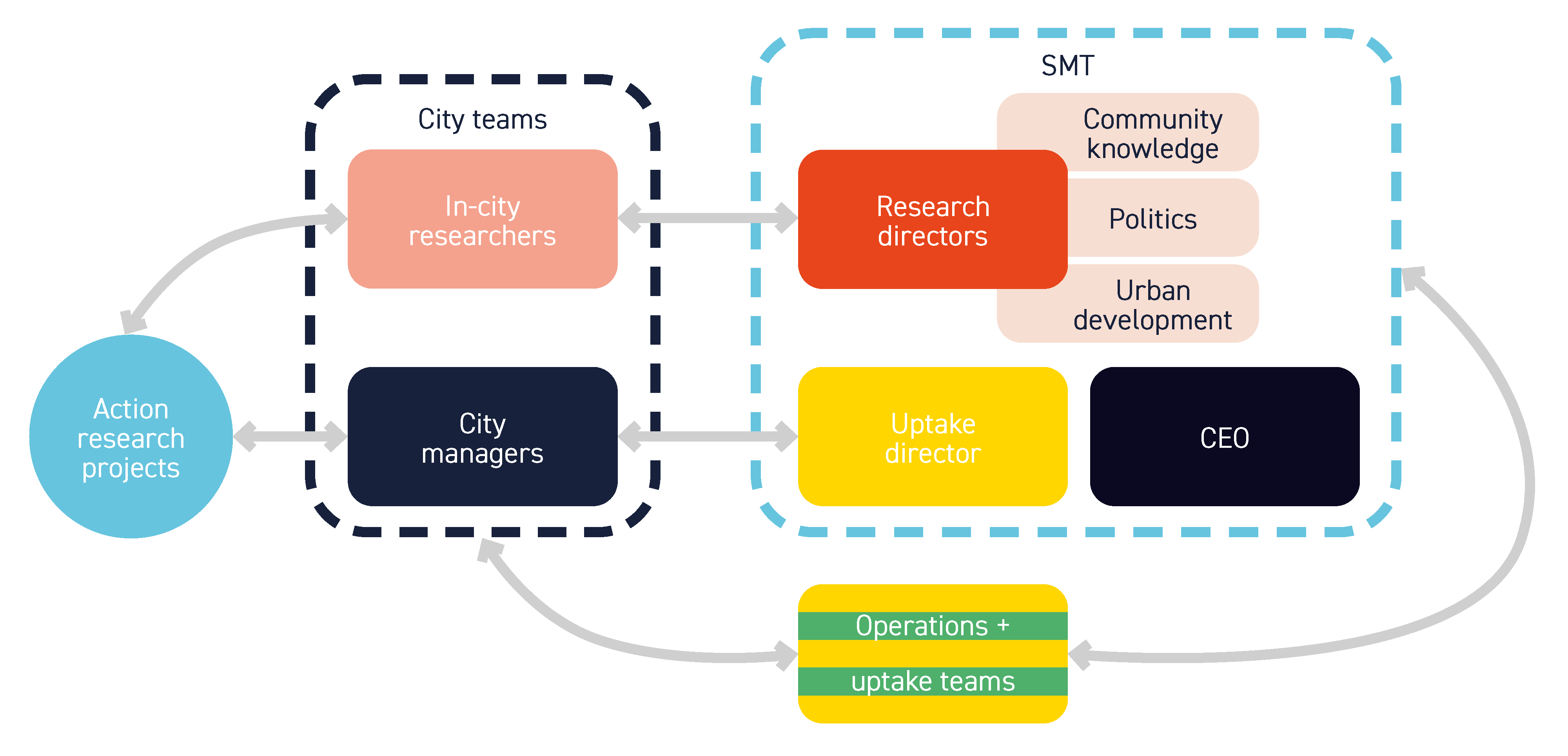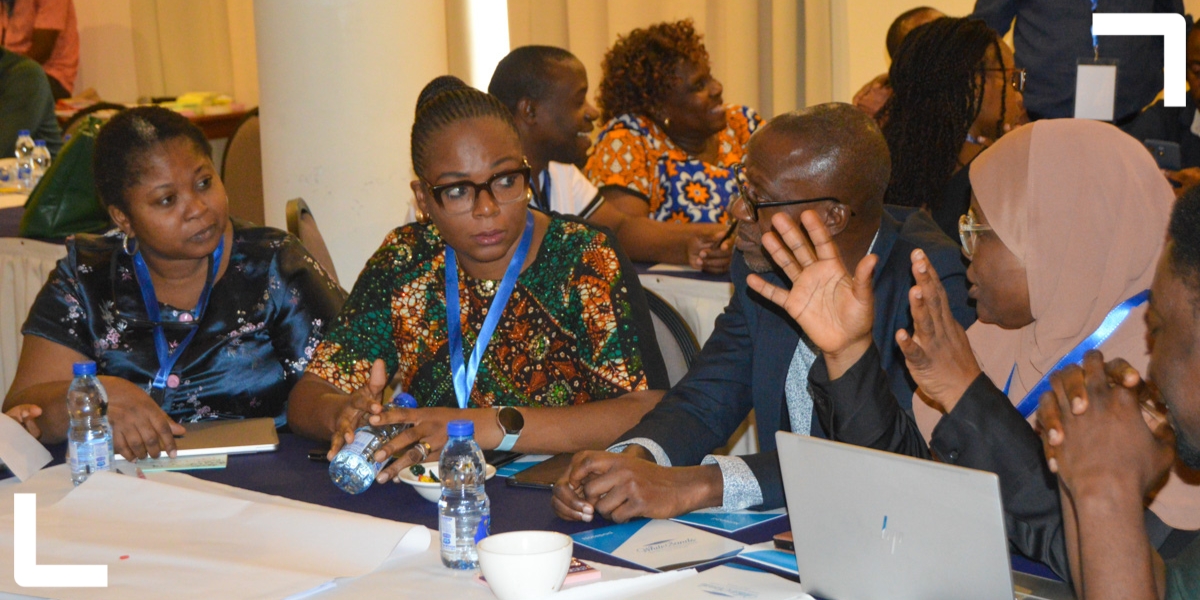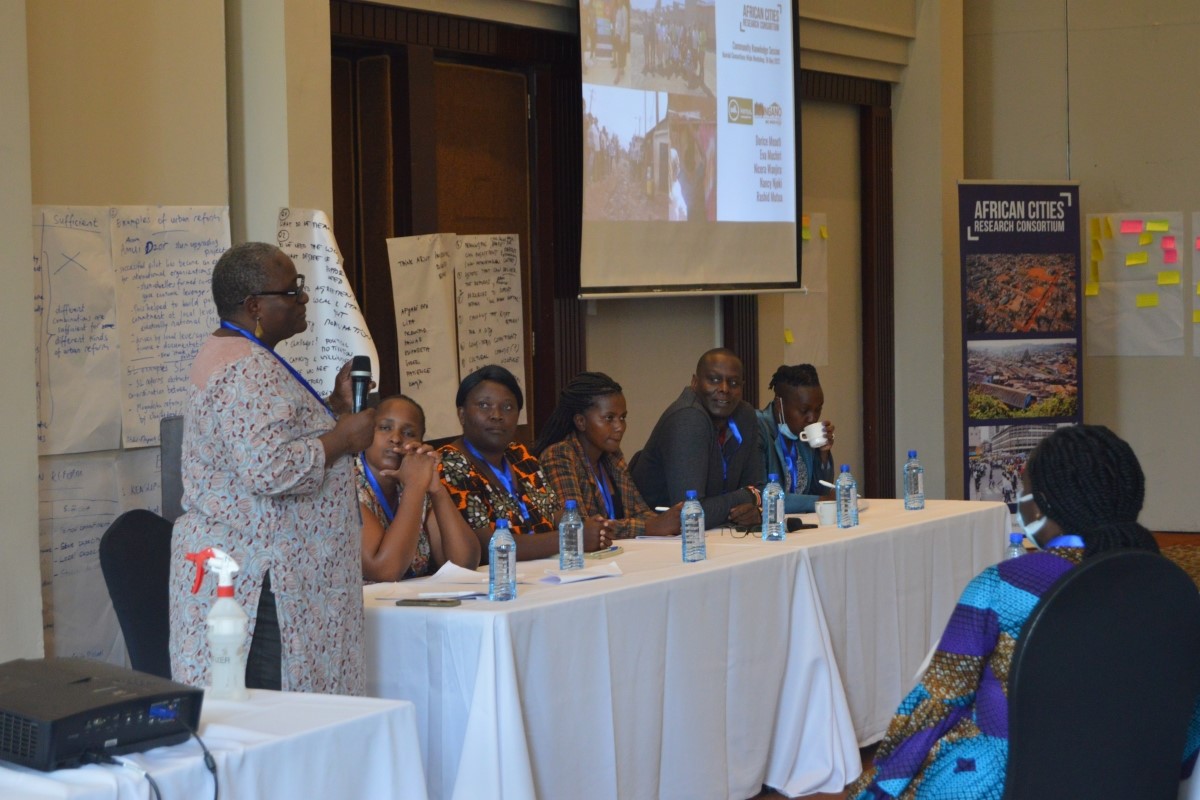From the outset of ACRC, we have recognised the essential contribution of diverse African researchers, including those based in the global North and South. We have also recognised the importance of working with knowledge-rich, city-specific research agencies and other local knowledge leaders.
We believe that it is only through foregrounding African expertise that we can secure our ambitions of better understanding and catalysing inclusive change across cities.
Our approach draws on decades of experience from across the consortium of co-producing research and action research with in-city academics, professionals and community researchers. So far, we have sought to develop and strengthen collaboration in order to deliver the ambitions of ACRC. In the long term, ACRC’s vision will be furthered by a strong group of African researchers, uptake specialists and implementers able to carry forward this approach.
As discussed in a previous blog, the decolonisation temperature check survey and follow-up interviews undertaken in mid-2023 raised a number of insights and recommendations. With some we were able quickly to adjust plans, but with more structural changes, we waited until ACRC transitioned from the initial foundation phase, to the implementation phase earlier this year.
This post attempts to summarise the key shifts we’ve made so far.
1. Localising decision-making and budgets to city managers
Probably the most significant change we’re making during the implementation phase is to give city managers (based within local reform organisations) primary responsibility for determining and developing the portfolio of action research projects within their city. They will also be responsible for the overall allocation of the city budget to undertake this work. While still working closely with SMT and other staff, city managers will ultimately be in control of developing and delivering the ACRC reform agenda within their location.
City managers (from Accra, Harare, Kampala, Lagos and Nairobi) will also come together as a group on a regular basis to share experiences and learning across the cities – and to help identify opportunities for regional or international impact around ACRC. This should enable them to both sharpen their work through learning from other cities, and to collectively challenge the senior management team.

ACRC’s decentralised governance structure for the implementation phase
2. Promoting African leaders and expertise
City managers will be supported locally by in-city researchers, focusing on community knowledge, politics and urban development. They’ll also have uptake support, as well as administrative capacity to draw upon. Again, the intention is to both catalyse urban reform processes within the city, and to provide cross-city learning and insights across these areas, which may be relevant for other African cities.
We’re also really proud of the contribution made by our cohort of postdocs during the foundation phase. We were able to appoint seven African research fellows and one with mixed heritage, all on merit. Half of their time was allocated to pursuing their own research interests, with the other half supporting domain work.
3. Co-developing conceptual framework and theory of change
A major criticism of the foundation phase was that too great an emphasis was given to the use of common research concepts, particularly around political settlements and city systems, with too little flexibility for local teams. The implementation phase will see greater freedom for local research teams to devise approaches that will address the problems being targeted.
We’re also planning a workshop in September with in-city research leads, to review and revise both ACRC’s conceptual framework and theory of change. This will be the starting point for co-developing the research approach throughout the implementation phase.
With respect to political settlements, we’ve already identified areas for improvement when it comes to the categorisation of political settlement types within the conceptual framework developed by ESID (Effective States and Inclusive Development research centre). Evidence from our foundation phase research did support the typology’s high-level predictions about the preconditions required for sustained elite commitment to inclusive urban development. However, at a more granular level, there were both similarities and differences in city experiences that it did not explain.
4. Focused work on community knowledge
Each city will have a lead focused on community knowledge, with this area of work coordinated at the consortium level by a dedicated research director (and SMT member). Developing the contribution of community knowledge – and building capabilities of community researchers and academic researchers who want to work more effectively and equitably with communities – will continue to be important.
Panel discussion on community knowledge and co-production at ACRC’s consortium-wide meeting in May 2022.
This will add value to our work and ensure its relevance for poverty reduction and equitable development. It will also offer lessons to others seeking to enhance the contribution of residents to development.
Reflection around the work on acknowledging and integrating community knowledge has already featured in several ACRC-organised spaces. Discussions were organised at both consortium-wide workshops – at a panel discussion in Nairobi, Kenya (2022) and as a roundtable discussion in Dar es Salaam, Tanzania (2023).
ACRC-affiliated researchers are also organising a panel at the UK Development Studies Association conference (26-28 June 2024), titled: “Community knowledge in academic research: in pursuit of epistemic justice”. This will cover collaborative research and knowledge co-production, seeking epistemic justice and exploring emancipatory research practices that meaningfully engage low-income and marginalised communities.
We will also continue to look for opportunities to produce communications outputs on the subject of community knowledge and co-production, particularly via the blog and podcast.
5. Additional support for wider ACRC city teams and researchers
To enhance our contribution to urban reform in the seven cities not moving forward to the implementation phase, we are providing transition grants of £40,000 to each city team, enabling them to maximise the impact of work undertaken so far.
And for Africa-based researchers who want to publish their work in high-profile academic journals, we have also set up ACRC’s Visiting Writer and Publications Support scheme. This provides payment, mentorship and, where needed, time and space in Manchester (or elsewhere) for people to develop and write their papers.
6. Ongoing monitoring of localisation and decolonisation
We fully recognise that localising and decolonising ACRC is an ongoing process. While we are excited by the changes we’re making for the implementation phase, this is something we will continue to monitor, reflect on and change where needed.
We’re keen to share our experiences, as we recognise that we are contributing to long-established traditions to nurture equitable research collaborations. And we also want to learn from others who share similar goals.
Header photo credit: Hannah van Rooyen. Group discussion at the ACRC consortium-wide meeting in Dar es Salaam, Tanzania in May 2023.
The African Cities blog is licensed under Creative Commons Attribution-NonCommercial-NoDerivatives 4.0 International (CC BY-NC-ND 4.0), which means you are welcome to repost this content as long as you provide full credit and a link to this original post.



